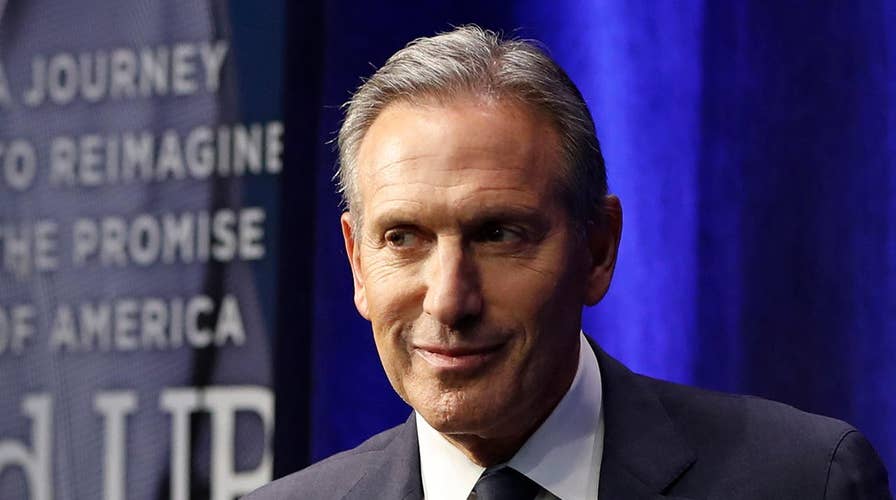Democrats are upset that Howard Schultz could split the Democratic vote causing Trump to be re-elected.
Former Starbucks CEO Howard Schultz is upsetting Democrats for having the nerve to say he's running for president as an independent.
One week after Howard Schultz dipped his toe into the presidential waters, the political world is still buzzing like a double red eye on an empty stomach. The outcome of his campaign remains uncertain, but Schultz has left an indelible imprint on the 2020 presidential race – even if his name never appears on a ballot.
Schultz burst onto the scene declaring President Trump “not qualified” to be president and offering himself as an alternative. He proceeded to spend his weeklong media blitz torching the unworkable policies demanded by the anti-Trump voters he’s courting. All told, the current commander-in-chief remained relatively unscathed from Schultz’s wrath.
In turn, Schultz accomplished something no one in the so-called “resistance” has done during the Trump era other than the president himself: bring the left together around a common enemy.
Outraged liberals swore off their daily dose of lattes and urged boycotts of the coffee chain. Alumni from the Obama administration began melting down on social media. Major Democratic opposition research groups declared all-out political war against Schultz. By week’s end Starbucks was giving baristas instructions on how to handle thorny political questions from customers.
It’s true that should Schultz move forward with a campaign he could peel off anti-Trump voters and play the spoiler role in a general election – a prospect that both terrifies and enrages the left. As a lifelong Democrat and self-described progressive, Schultz’s policies are more in line with the left than the right. He’s a long-time donor to Democratic politicians, and until this week, his left-wing credentials were never in question.
No two races or third-party candidates are identical, and it’s a mistake to assume Schultz will only pull from the left. But Schultz’s willingness to blast Kamala Harris' plan to end private health insurance as “un-American,” and label Elizabeth Warren’s tax scheme “socialism,” will leave a long-lasting mark. He articulately highlighted the unworkability and extreme price tag of the left’s policy agenda in stark terms that cut through all the other noise.
Schultz has reminded voters who may be seeking an alternative to Trump – those suburban, swing and college-educated centrists who swung hard to the Democrats in last year’s midterms – that there is no place for them in today’s Democratic Party. The enemy of my enemy is my friend, and the more that Democrats and Schultz eviscerate each other, the more attractive his candidacy could appear to disaffected Republicans.
As the left grows increasingly hostile toward the private sector and embraces all-out socialism, the days of celebrating success no longer cross party lines. Wealthy people are viewed with deep suspicion by progressives – even someone like Schultz, whose rags-to-riches story from the Brooklyn projects embodies the American dream.
In 1960, Democratic standard-bearer John F. Kennedy declared his belief “in an America where the free enterprise system flourishes for all other systems to see and admire.” Today, Elizabeth Warren, who occupies the same Senate seat once held by Kennedy, attacks successful people as “freeloaders” in her push for a wealth tax that Schultz called “ridiculous.”
It’s no wonder Schultz has concluded his pro-capitalism views are as welcome in the Democratic Party as ordering a venti Starbucks caramel macchiato at a Dunkin’ Donuts drive-through.
CLICK HERE TO GET THE FOX NEWS APP
All the Schultz drama played against the backdrop of a tough period for President Trump. The president began his week feuding publicly with his own intelligence chiefs and ended it facing growing opposition from fellow Republicans over his handling of wall funding. A poll from ABC News/Washington Post showed 56 percent of voters planning to definitely vote against Trump next year.
But presidential contests are choices and not referendums. Voters will have two – or three – distinct choices when 2020 rolls around. Thanks to Howard Schultz, the spotlight is shining on the extreme nature of the Democratic Party, and maybe – just maybe – he’s sending voters who are uneasy with the current president, but uncomfortable with socialism, back to Trump.

